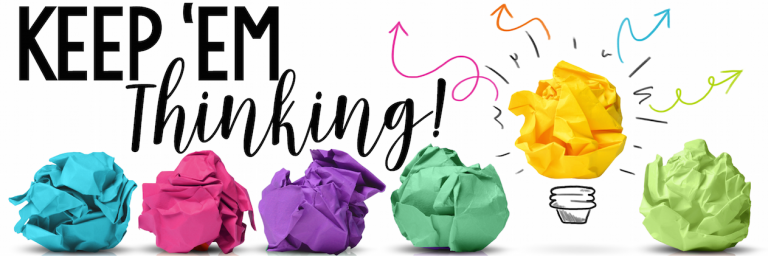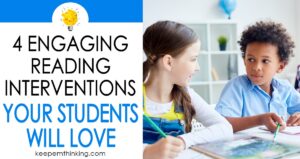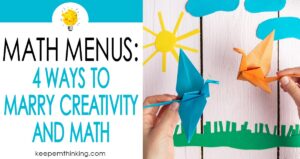As educators, we often assume that gifted students will excel on their own without requiring much support from us. However, it’s important to remember that gifted learners have unique needs that may not be immediately apparent. In my last blog post, I shared what gifted students wish their teachers knew about them. There was so much more I wanted to share that I decided to write another one! So here are eight more things that gifted students wish you knew. When you understand the feelings of your gifted students, you are better able to support them in your classroom!
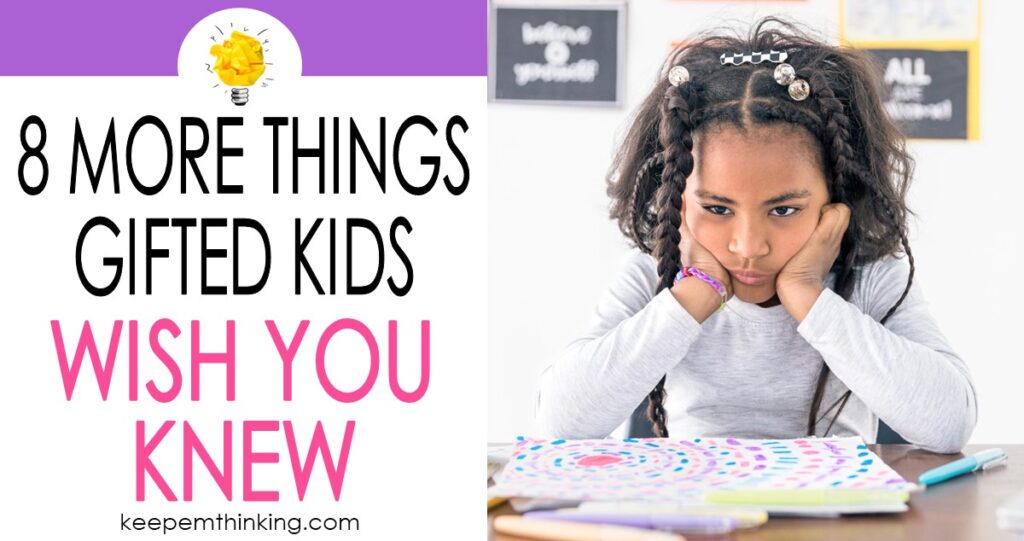
1. “I may be smart, but I’m not perfect. Expect me to sometimes make mistakes.”
It may take you by surprise, but it eventually will happen. Your gifted students will mess up. As amazing as gifted students are, they are still human and will make mistakes like everyone else. It’s how you teach students to handle these mistakes that make an impact on their learning and self-esteem.
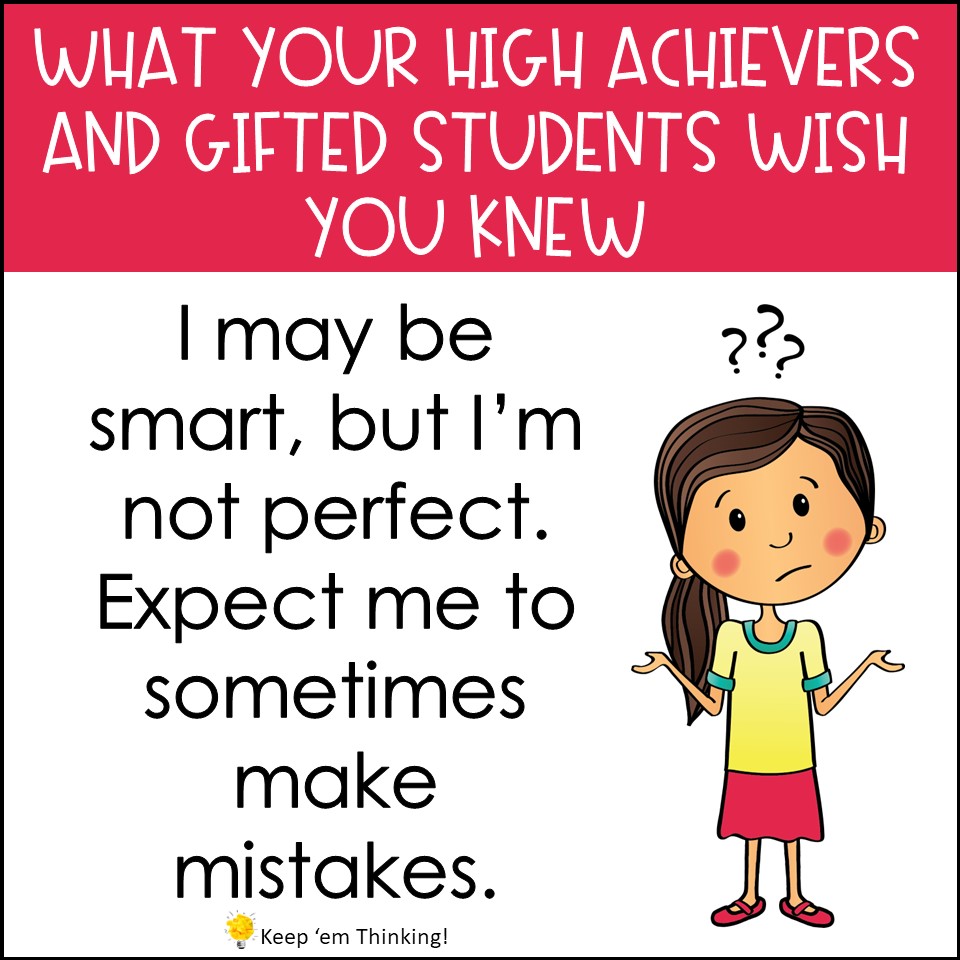
Gifted students typically want to know “why” when they have made a mistake, so giving feedback is crucial. When correcting a gifted student, be specific, clear, and constructive.
Your gifted learner may get upset that they “were wrong”, so focus on the mistake rather than the student. Help them to see the mistake as an opportunity for growth and learning, rather than a failure.
Encourage them to reflect on what went wrong, what they can do differently next time, and how their mistakes actually help them grow to ensure your high flyers don’t get too down on themselves.
2. “I can learn many things on my own, but not all things. Sometimes I need guidance and direction.”
As independent as they may be, gifted students benefit from guidance from you. They are still kids, after all, so many haven’t quite developed time management skills just yet.
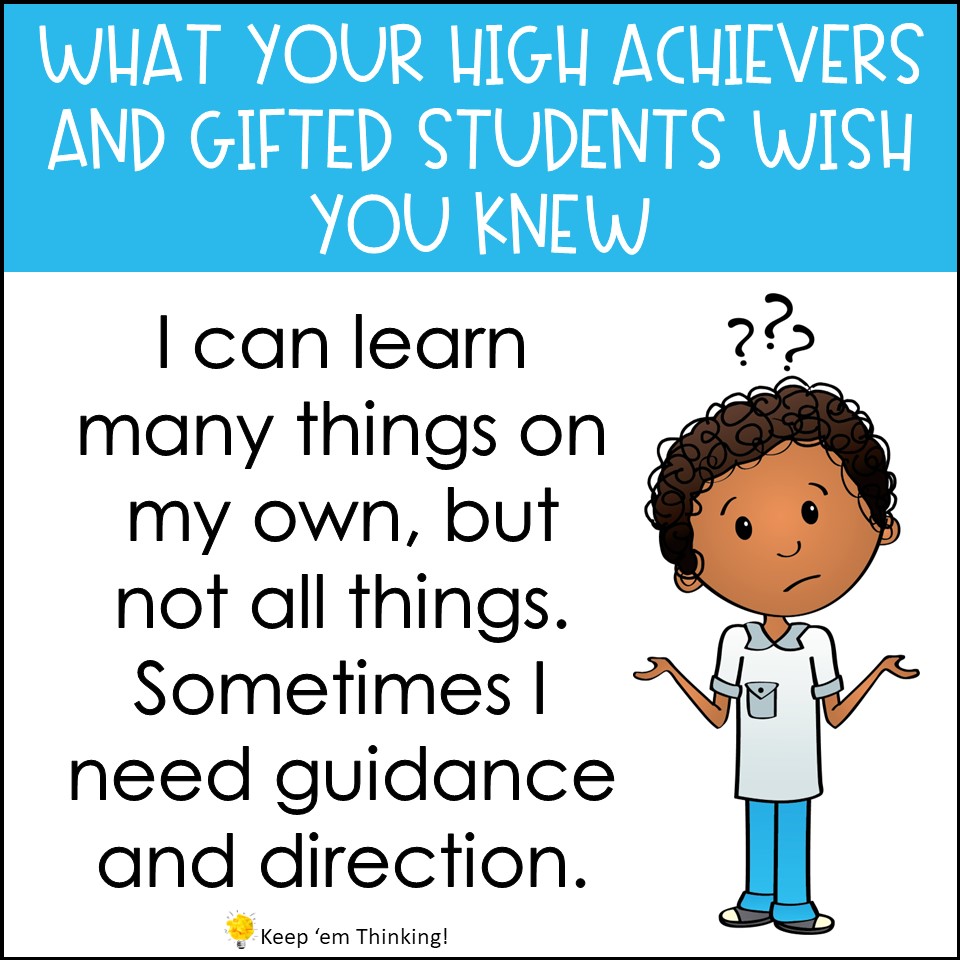
Your gifted learners may have trouble keeping track of how long it takes to do something so time management strategies and goal-setting techniques can help them stay on track. Gifted students also have a natural curiosity and excitement for learning, but they still need access to appropriate resources and knowledge of what to do with those resources once they get them.
Provide your gifted learners with challenging activities that will stimulate their curiosity. Encourage them to ask questions, explore topics of interest, and conduct independent research.
When working on activities and projects, set parameters with clearly defined learning objectives and criteria for success. Support your students by encouraging creativity and innovation while checking in on them periodically to see how they are coming along. They may need to talk their ideas over with you to get clarity or move through sticking points.
3. “Sometimes I feel overwhelmed by the expectation of others and myself.”
A trait often associated with gifted learners is perfectionism. They set standards for themselves that are too high and not easily achieved. They feel pressure to maintain those standards (high grades, perfect behavior, etc…) and fear failure or disappointing others.
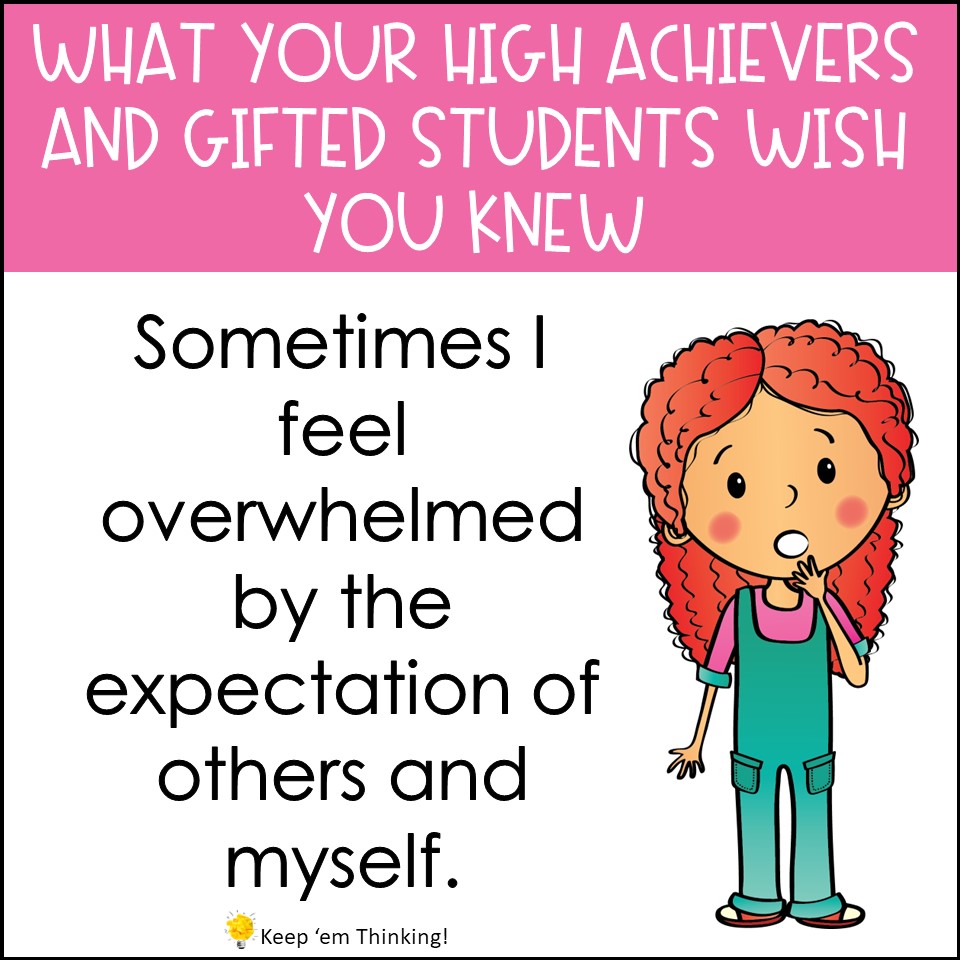
This can create an overwhelming sense of pressure and stress that can be difficult to manage, especially for young learners. They tend to feel that they are expected to perform at a higher level than their classmates which can zap the fun out of learning.
Teachers can help students break the idea of “being perfect” by normalizing mistakes and encouraging risk-taking. Students need to understand that mistakes are really opportunities for growth. Oftentimes, learning from mistakes is more effective than learning something the first time it’s taught! Show students that feedback can improve their performance and understanding rather than a measure of their worth or abilities. Focusing on growth rather than perfection can help gifted students enjoy the journey of learning instead of fearing failure.
4. “Because so many things are easy for me, I may become frustrated when something gets hard.”
If we’re being honest, many gifted kids get used to “being smart” and everything comes easy to them. They are also used to receiving praise for their accomplishments.
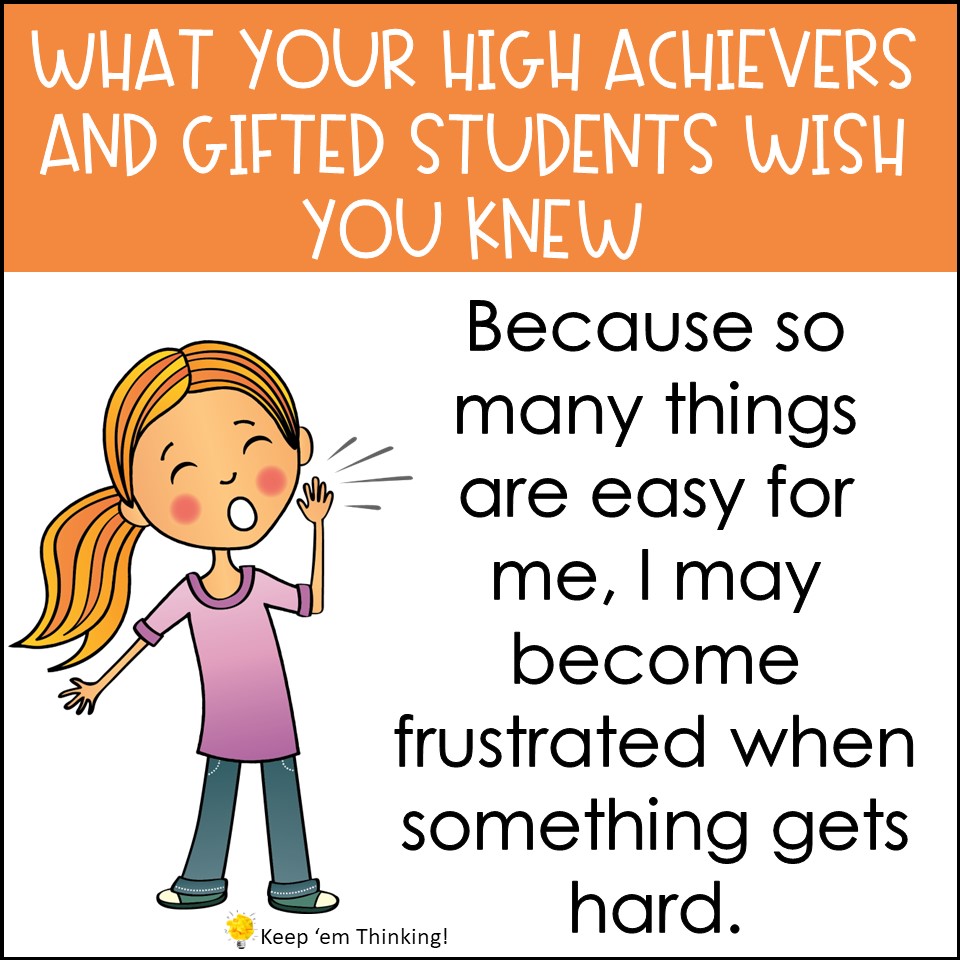
So when they encounter something difficult for them, it can be a real surprise. Not to mention frustrating. A topic taking longer than usual to understand is a new sensation for them (and it’s definitely not one they enjoy!).
To help your gifted students cope with frustration when they struggle, try encouraging a growth mindset.
Specifically, focus on “the power of yet” as students need to realize that just because something is difficult now doesn’t mean it will stay that way.
Discuss the concept of perseverance and how continuing to work at something difficult paves the way for future success!
5. “I may put too much pressure on myself to be perfect and the best in class.”
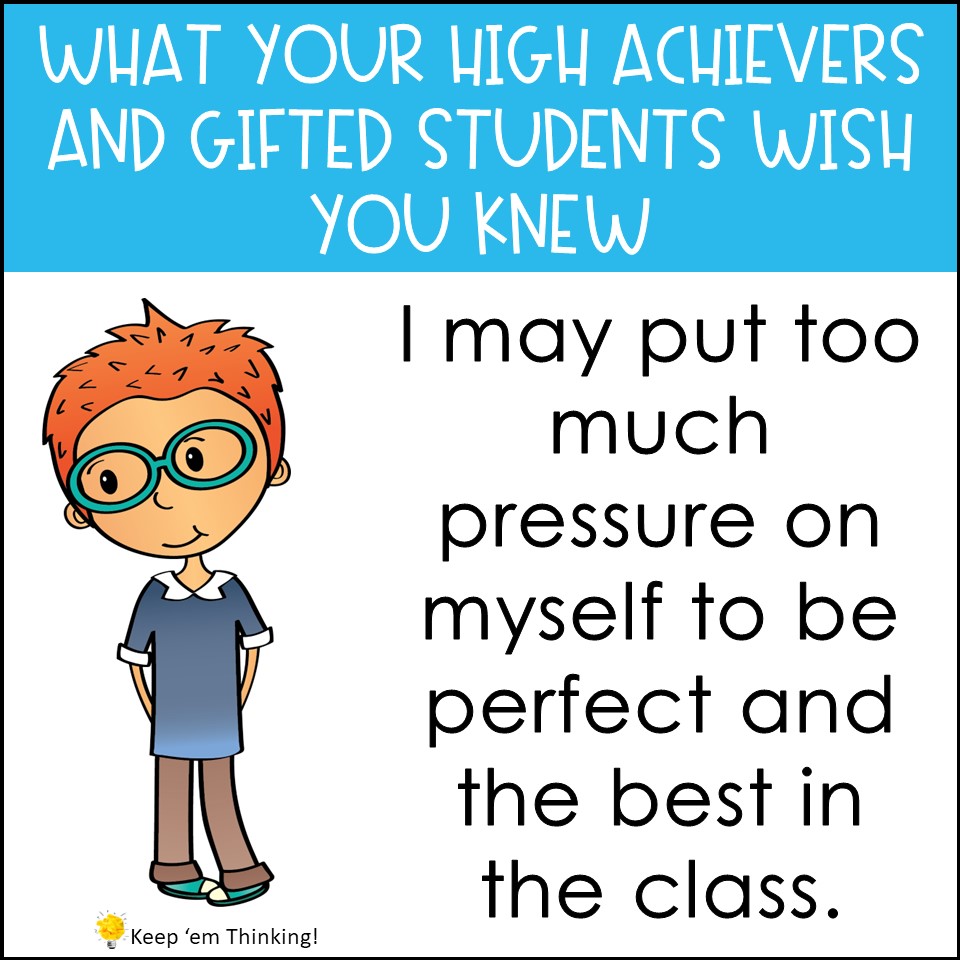
Gifted students often put pressure on themselves to be the best due to high expectations placed upon them, creating a fear of failure and a hyper-focus on achievement and success.
These kids also tend to have a strong desire for recognition and praise. This desire for attention leads to a competitive mindset and the need to be the best.
Try using activities that don’t have a grade or a “winner”. When grades and competition are taken out of the equation, gifted students who struggle to “be the best” can just focus on having fun.
Also, choose activities that don’t have one right answer. Value creativity and innovation over “correct answers” to show these perfectionists that there’s more to thinking and learning than a perfect score.
6. “I can be gifted and still have a disability.”
It’s important to know that gifted students can also have disabilities. Just because a student is gifted doesn’t mean they don’t need extra help. Research shows that gifted students are more likely to have learning disabilities such as dyslexia or ADHD than students who are not identified as gifted. Sometimes, gifted students may also have physical disabilities that affect their learning or ability to participate in certain activities.

Try breaking tasks into smaller chunks to help the student focus and feel less overwhelmed. It’s also important to provide frequent feedback and positive reinforcement to motivate and reward.
Multisensory instruction can also help your struggling gifted students learn. This means using a variety of teaching methods, such as visual aids, hands-on activities, and interactive technology to reinforce learning.
If you have a gifted student who struggles in one area but excels in another, consider reaching out to your school’s Exceptional Children’s teachers for help. They can recommend strategies to use and even get the ball rolling with possible testing if you truly feel there could be a learning disability.
7. “I often put pressure on myself to succeed and be the smartest kid in the class.”
Once again, that perfectionist tendency rears its ugly head! Gifted students are the first ones to expect that they are perfect and will beat themselves up if they aren’t.
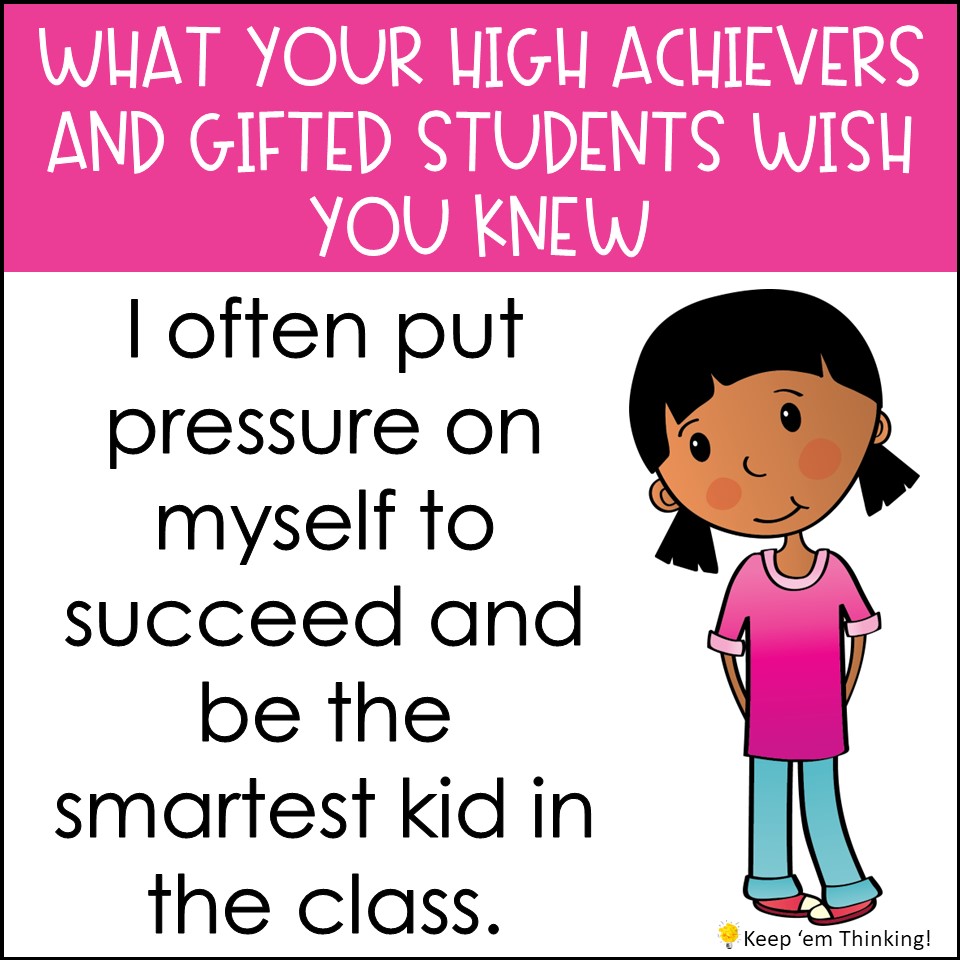
When they are confused about something in class or have a question during a lesson, they oftentimes won’t ask for help because they fear the rest of the class will think they aren’t smart anymore.
One way to allow gifted students to share their feelings and questions is to keep a question box on your desk. Gifted learners (as well as any student in your class) can write their questions down and ask them without fear of looking foolish. If they can save face, they are more likely to reach out for help. Many gifted students would rather not know the answer to their question than admit they don’t understand and lose their “smartest kid in the class” status.
8. “I can be intense. I experience things in greater depth than many kids.”
Gifted students just naturally tend to feel things like excitement or frustration more strongly than someone else might. They’re also really good at picking up on the emotions of others.
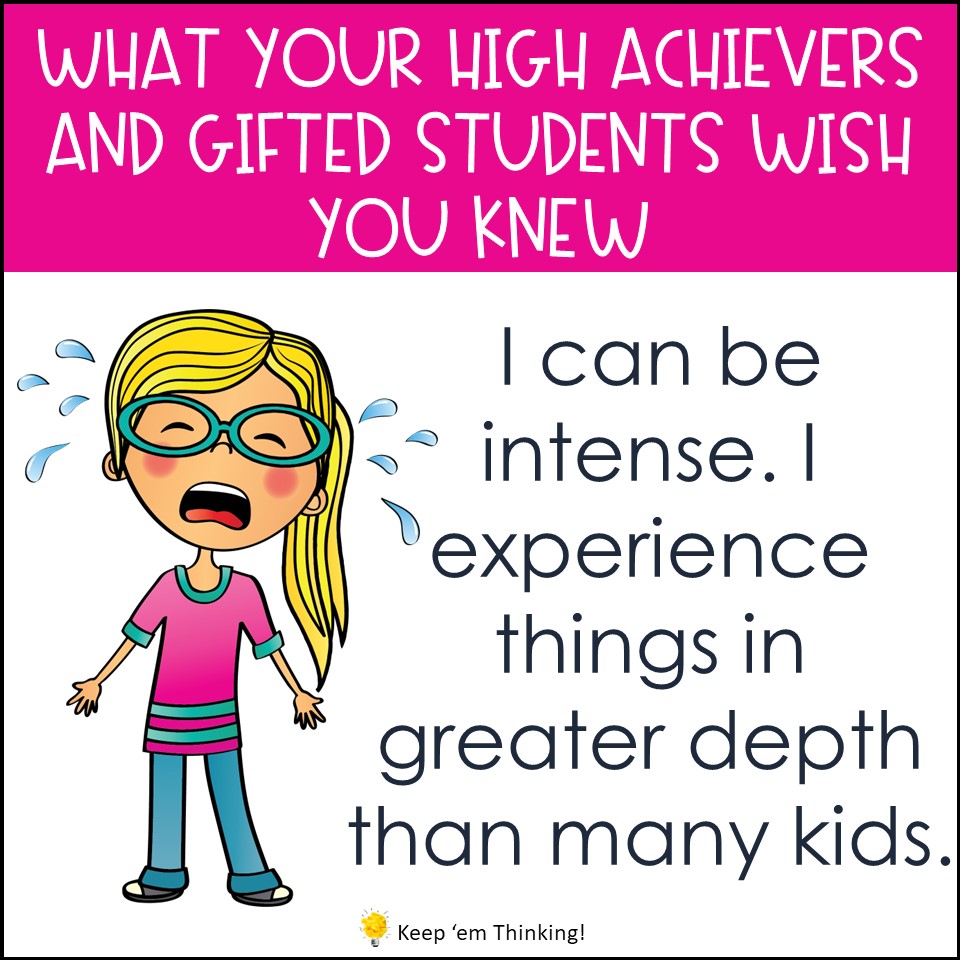
They can be quite empathetic to what other people are feeling. Some gifted kids might experience emotions more strongly because their anxiety causes them to overthink things.
Help your students develop skills to regulate their big emotions. Teach them deep breathing techniques, positive self-talk, and mindfulness exercises.
Encourage them to take breaks when they need to, and provide a quiet space where they can go to calm down.
Many gifted students respond positively to drawing or writing when they feel very upset or anxious.
Your gifted students will be so grateful that you understand them!
Regardless of how talented and amazing your gifted students are, they have insecurities and need your support! I hope that this post has shown you how your gifted students feel and empowered you with strategies to encourage your kids!
Pin these ideas about Gifted Students to Pinterest!
Don’t want to forget the advice you found here today? Pin this post to Pinterest to help you when you need ideas on how to connect with your gifted students!

